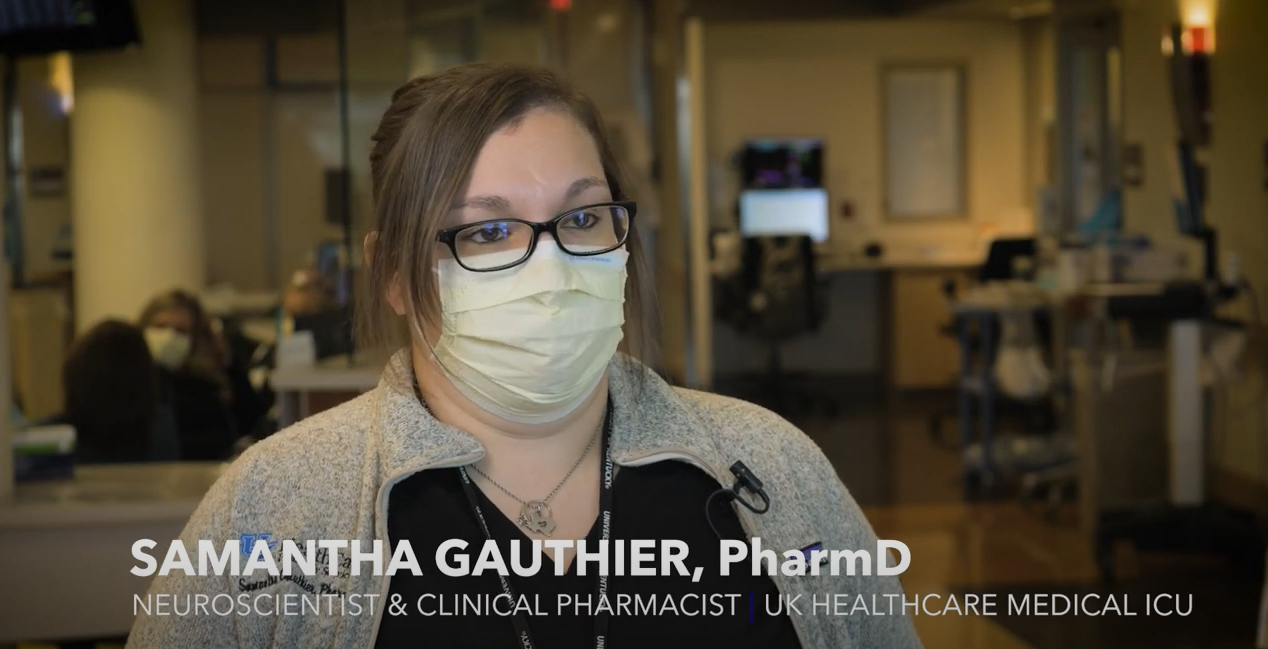Voices from the Front Lines: Samantha Gauthier

We recently joined hospital staff for a few days to document the reality of treating COVID-19 patients in UK HealthCare clinical settings.
This edited interview is part of our ongoing series, “UK HealthCare: Voices from the Front Lines,” highlighting stories and perspectives from our frontline staff who have cared for the sickest COVID-19 patients since March 2020.
Samantha Gauthier, PharmD, is a neurosciences and pulmonary critical care pharmacist with UK HealthCare.
What has it been like over the past 18 months?
When COVID first started in March of 2020, everyone was really unsure what was going to happen. We had a lot of administrative support saying, ‘this is what we're going to do to try to help both our employees and our patients. We're going to try to anticipate the surges that come along.’
When we started seeing these patients, we didn't quite realize how sick they could be or how sick they were going to be.
We didn't necessarily have to deal with those massive surges, like places like New York had to do, which I was really grateful for. But … it was really difficult because you got to see a lot of your older patients that were getting really, really sick at the beginning. They could be sitting up talking to you, having a conversation with you, but they didn't realize how hypoxic (low oxygen levels) they were. Meanwhile, providers were panicking in the background, looking at their numbers, saying they the patient about to crash and they have no idea.
Now, I think we have a better idea of what these patients look like. But … these patients are getting a lot sicker, a lot faster. Now we're seeing patients that are a lot younger, in their late 20s, their 30s and 40s —who were otherwise healthy that are coming in, and they got sick so quickly.
They said, ‘oh, I just started having symptoms yesterday or the day before yesterday.’ And before they know it, before the family knows it, they're intubated and trying to be treated with these experimental drugs that we don't know how well they work or not.
I think that's the biggest difference between March of 2020 and now: patients are a lot younger, a lot sicker. We have a lot more pregnant patients coming in and outcomes for all the patients this go-around are not nearly as good.
What’s the process been like for researching treatment options for COVID?
We have a COVID subcommittee that works on reviewing literature every single day. They meet every four weeks to reevaluate what our recommendations for this institution or are going to be, and they do a thorough search of the literature and try stay in front of, ‘are these treatments actually useful for the patient?’ There's actually been drugs that we've stopped using completely because we thought that they would work, but they actually don't work at all.
How hard has it been for the staff during this latest wave?
I'm here both during the day as well as up until 11 at night. So, I get to see both the daytime crew and the nighttime crew. People … who've been here for years and have taken care of patients for years, just got tired of seeing people die every single day and it takes its toll on every single provider that takes care of patients.
There's been days when there's four and five people dying at a time and there's nothing we can do. We're here to help people with every single resource we have, and when it fails it is so disheartening.
And in the middle of that, I was pregnant and gave birth to my now 6-month-old. I was working on the COVID floor while I was pregnant during the first surge. Everyone wanted to keep me safe, but also, I wanted to keep other people safe. And I think that's kind of the mindset of everybody who works in the hospital here; they want what's best for the patient. They put themselves aside for so long, and they give everything that they have no matter what. And if we have something like what's going on now with this pandemic, it lasts for a year and a half, it's draining both emotionally and physically.
Seeing all these patients pass away and seeing their families, I think that's one of the hardest parts. During the first surge, families weren't allowed to come and see their family members and their family member had to die alone. I don't feel that anyone should have to have to die alone.
Providers and nurses were holding the hands of patients so that they would have somebody at the bedside. Now they're allowing families to come in and see their family member and it almost hurts even more actually to see, because you get to see the pain that these families are going through. And it makes me just want to scream to everybody in society, ‘We can help prevent this from happening.’ If you had to see the pain and the anguish that these families were having to go through, wouldn't you want to prevent that?
What would you like the outside community to understand about what happens here in the hospital during a COVID surge?
Resources have always been really easy. Everyone is used to being able to walk into the hospital and get whatever care they need at any point in time. But when our hospitals are full of COVID patients, those resources are being filled. We are utilizing every resource that we can to help those patients.
Resources are much more limited than people think there are, and taking care of yourself is going to be the best way to help everybody in the community. Because if you don't take care of yourself, then you're going to end up here.




